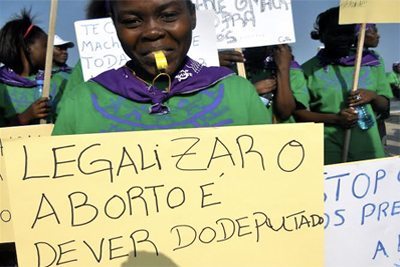Get Angry: 41 Years After ‘Roe,’ Thousands of Women Are Dying From Unsafe Abortions
Nearly all of the 47,000 women who die each year from an unsafe abortion live in developing countries. Our domestic policy contributes to that statistic.

By the time you finish reading this article, another woman could lose her life to an unsafe abortion because her access to safe care was restricted.
And on her behalf, I’m asking you to get angry.
On the 41st anniversary of Roe v. Wade, there’s not much to celebrate. A recent Guttmacher report showed more state abortion restrictions were enacted from 2011 to 2013 than in the entire previous decade.
Can the progress made in 40 years be undone in three? When it comes to Roe v. Wade, it sure seems possible.
If anti-choice lawmakers have their way, 2014 won’t be any different. Headlines about abortion policy are so outrageous, they don’t even seem real. Just last week, a representative from Virginia argued that limiting abortion promotes job creation, the governor of Kansas equated abortion with slavery, and the State of Texas kept a brain-dead woman on life support against her family’s wishes in the name of abortion politics.
Policy makers in the United States continue to dictate “what’s best” for women’s health with zero regard for the women themselves. Meanwhile, the world’s women pay the price with their freedom and their lives.
Forty-one years after Roe v. Wade, we’re losing ground on the right to abortion, and what’s more, we’re exporting our regressive policies elsewhere.
I’m often asked why one should support women’s health and rights in developing countries when we’re facing serious problems here at home.
Nearly all of the 47,000 women who die each year from an unsafe abortion live in developing countries. Our domestic policy contributes to that statistic.
The United States prides itself on being a leader on human rights issues, yet refuses to budge on harmful policy restrictions like the Helms Amendment, which prohibits U.S. foreign assistance funding from being used to provide abortions “as a method of family planning,” even in countries where abortion may already be safe and legal.
While the amendment allows funding for abortion referrals and abortion in the cases of rape and incest, the policy is rarely interpreted that way. Instead, the amendment is carried out as a total ban, a ban that even drives countries that already offer access to safe, legal abortion to question those policies.
The harmful effects of the Helms Amendment disproportionately affect poor and disadvantaged women living in developing countries. Women and girls who are victims of rape in conflict cannot access safe abortion services. Women with life-endangering pregnancies cannot either.
And when these women feel they have no other choice, they often turn to unsafe abortion services, putting their lives at risk. Unsafe abortion is responsible for 13 percent of the world’s maternal deaths, and yet is entirely preventable.
So let’s prevent those 47,000 deaths together. Let’s stand for choice everywhere.
I’m not asking you to choose to support one or the other. I’m asking you to get angry on behalf of all women, everywhere.
Take action by writing your Congressperson, sharing this article on social media, and rallying your friends and family members to support women’s reproductive rights.
A woman’s choices about her body are hers and hers alone. Safe, legal abortion is a human right.
Before yet another health clinic is forced to shut its doors to an abortion patient anywhere, let’s remind our lawmakers that their political games don’t just hurt American women. They hurt all women.
